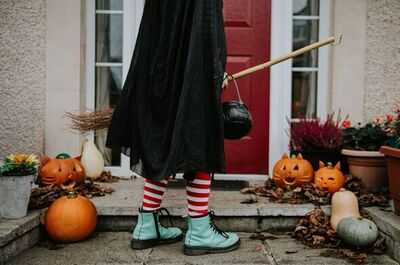
Brits have been warned that certain trick-or-treating habits could land them with a fine of up to £5,000. Approximately 7.5 million Brits participate in trick-or-treating, according to the latest population data and national polling.
This year, parents are being warned that a long-standing Halloween tradition could land families in court. Legal experts at Free Grants For Felons say repeatedly knocking on a house that displays a clear "no trick-or-treaters" sign could, in extreme cases, be treated as harassment - opening the door to fines or damages. A spokesman said: "If a home displays a "No trick-or-treaters" sign and you (or your kids) keep knocking, that can lead to harassment.. This opens the door to civil claims, police action, and hefty fines. If caught and it escalates this could even go on your record affecting things such as future employment." Since March 2015, magistrates can impose unlimited fines for many offences that used to be capped at £5,000 - and harassment-related penalties are means-tested and can run to thousands depending on severity and impact. Civil harassment cases can also result in damages and injunctions on top.

Brits have been urged to tell their children: "If you see a 'No trick-or-treaters' sign, we don't knock. If nobody answers, we don't try again. We keep moving."
The legal experts at Free Grants for Felons have compiled a list of what not to do to stay within the law
-
Don't knock any door with a "No trick-or-treaters" sign - one knock ignored might be forgiven; repeat knocks can create the "course of conduct" needed for a harassment claim.
Don't circle back to the same house later - that can look like persistence or intimidation.
Don't go late - night-time visits spike complaints and raise the risk of ASB enforcement.
Don't ignore undecorated/dark houses - they're not taking part; move on.
Under the Protection from Harassment Act 1997, harassment is behaviour that causes alarm or distress and forms a "course of conduct" (at least two occasions).
Repeated knocking after a clear refusal can meet that test. Civil injunctions and damages are available; in criminal cases, courts can also impose fines and (in serious cases) custody.
Police and councils can also deploy civil injunctions, Community Protection Notices or Criminal Behaviour Orders where nuisance escalates.
Police say Halloween is one of their busiest nights for nuisance calls, and they mount special operations with increased patrols to stop door-to-door anti-social behaviour - confirming the real-world risk when groups persist at homes that don't want callers.
You may also like

12,000 special trains operating, stop overcrowding rumours, appeals Railway Minister Vaishnaw amid festive rush

Rio Ferdinand's emotional reason he didn't speak about wife's cancer battle

McLaren make decision on prioritising Oscar Piastri as Max Verstappen threat escalates

I visited one of the UK's 'worst' seaside towns - I'd go back for 1 thing alone

BBC licence fee must surely be scrapped - it's become a £174.50 tax on indifference







